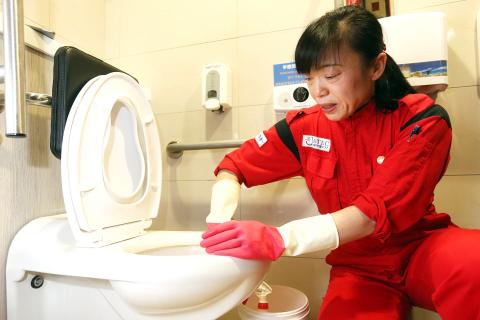Haruko Niitsu, who is called a national treasure in Japan for her excellent cleaning at Tokyo Haneda Airport, arrived in Taiwan yesterday to attend a forum on cleaning and give advice to workers at Taipei International Airport (Songshan airport).
Niitsu was born in Shengyang City in China’s Liaoning Province to a Chinese mother and a Japanese father. Her father was an orphan adopted by a Chinese father after the World War ll.
When she was 17, her family relocated to Japan through a program that helped people of Japanese descent residing in China return to their homeland.

Photo: CNA
Niitsu holds a license issued by the Japanese government to clean buildings and is a professional training counselor for more than 700 cleaning technicians at Haneda.
Because of the crew’s extraordinary work, Haneda was named the world’s cleanest airport by Skytrax in 2013, 2014, last year and this year.
She has also published several books teaching people how to efficiently clean their houses.
Niitsu changed into her Haneda uniform after arriving at Songshan airport and went directly to coach Sincere Group workers.
She first watched them do their restroom routine, including wiping the mirrors and countertops, scrubbing sinks and cleaning the toilets, and then demonstrated what she would do to make them cleaner.
The toilet seat cover, the seat and the rim under the seat should all be wiped as well as scrubbed, she said.
“You cannot clean these areas using a brush with a handle, because you will miss a lot of spots, such as the area inside the toilet rim. Smells would eventually come from these spots if they remain dirty, and because the air inside the restroom does not always circulate properly, the walls would absorb the odors and make the restroom smelly, so you need to find ways to clean those difficult-to-reach spots,” she said.
Niitsu showed her cleaning kit, which contains a small paint brush, several pencil-like sharpened bamboo sticks, wipes and other items.
The tools could either be bought or made, she said.
Niitsu, who is also known for her ability to use 80 different kinds of detergents, said her expertise comes from years of on-the-job experimentation.
“It all depends on the material of the item you are about to clean,” she said.
For example, to remove black spots on a stainless steel water fountain, she said that a neutral detergent must first be used to clean the surface, then an acidic detergent must be applied to remove the spots.
Compared with women’s restrooms, Niitsu said that it is more difficult to clean the men’s.
“Women are more aware of keeping the restroom clean, and the urine is less likely to splash out of the toilets, because they have to sit down. Men are less careful when peeing at urinals,” she said.

Chinese spouse and influencer Guan Guan’s (關關) residency permit has been revoked for repeatedly posting pro-China videos that threaten national security, the National Immigration Agency confirmed today. Guan Guan has said many controversial statements in her videos posted to Douyin (抖音), including “the red flag will soon be painted all over Taiwan” and “Taiwan is an inseparable part of China,” and expressing hope for expedited reunification. The agency last year received multiple reports alleging that Guan Guan had advocated for armed reunification. After verifying the reports, the agency last month issued a notice requiring her to appear and explain her actions. Guan

GIVE AND TAKE: Blood demand continues to rise each year, while fewer young donors are available due to the nation’s falling birthrate, a doctor said Blood donors can redeem points earned from donations to obtain limited edition Formosan black bear travel mugs, the Kaohsiung Blood Center said yesterday, as it announced a goal of stocking 20,000 units of blood prior to the Lunar New Year. The last month of the lunar year is National Blood Donation Month, when local centers seek to stockpile blood for use during the Lunar New Year holiday. The blood demand in southern Taiwan — including Tainan and Kaohsiung, as well as Chiayi, Pingtung, Penghu and Taitung counties — is about 2,000 units per day, the center said. The donation campaign aims to boost

The Kaohsiung Tourism Bureau audited six hotels in an effort to prevent price gouging ahead of Korean band BTS’ concert tour in the city scheduled for Nov. 19, 21 and 22 this year. The bureau on Friday said that the audits — conducted in response to allegations of unfair pricing posted on social media — found no wrongdoing. These establishments included the local branches of Chateau de Chine, Hotel Nikko, My Humble House, and Grand Hai Lai, it said, adding that the Consumer Protection Commission would have penalized price gougers had the accusations been substantiated. The bureau said the Tourism Development Act

BACK TO WINTER: A strong continental cold air mass would move south on Tuesday next week, bringing colder temperatures to northern and central Taiwan A tropical depression east of the Philippines could soon be upgraded to be the first tropical storm of this year, the Central Weather Administration (CWA) said yesterday, adding that the next cold air mass is forecast to arrive on Monday next week. CWA forecaster Cheng Jie-ren (鄭傑仁) said the first tropical depression of this year is over waters east of the Philippines, about 1,867km southeast of Oluanpi (鵝鑾鼻), and could strengthen into Tropical Storm Nokaen by early today. The system is moving slowly from northwest to north, and is expected to remain east of the Philippines with little chance of affecting Taiwan,